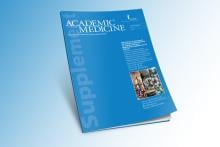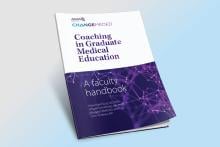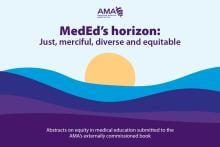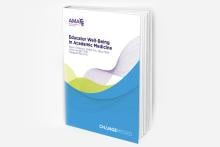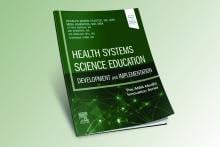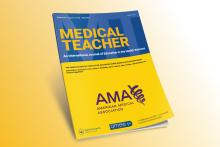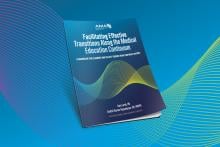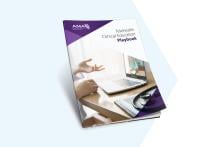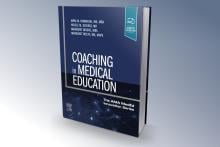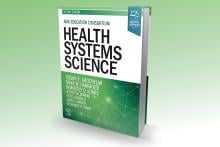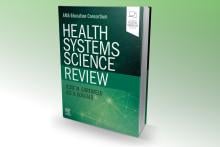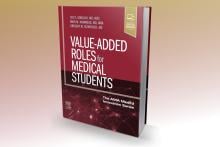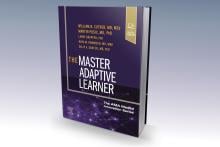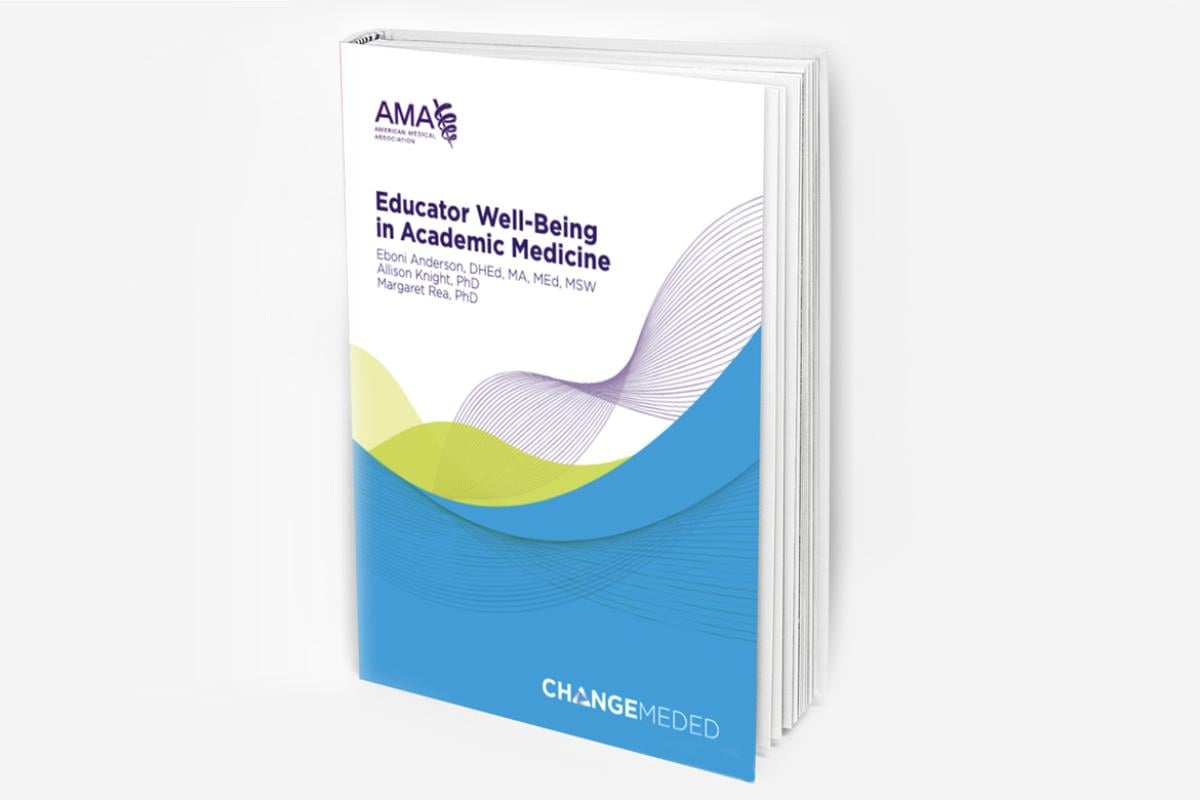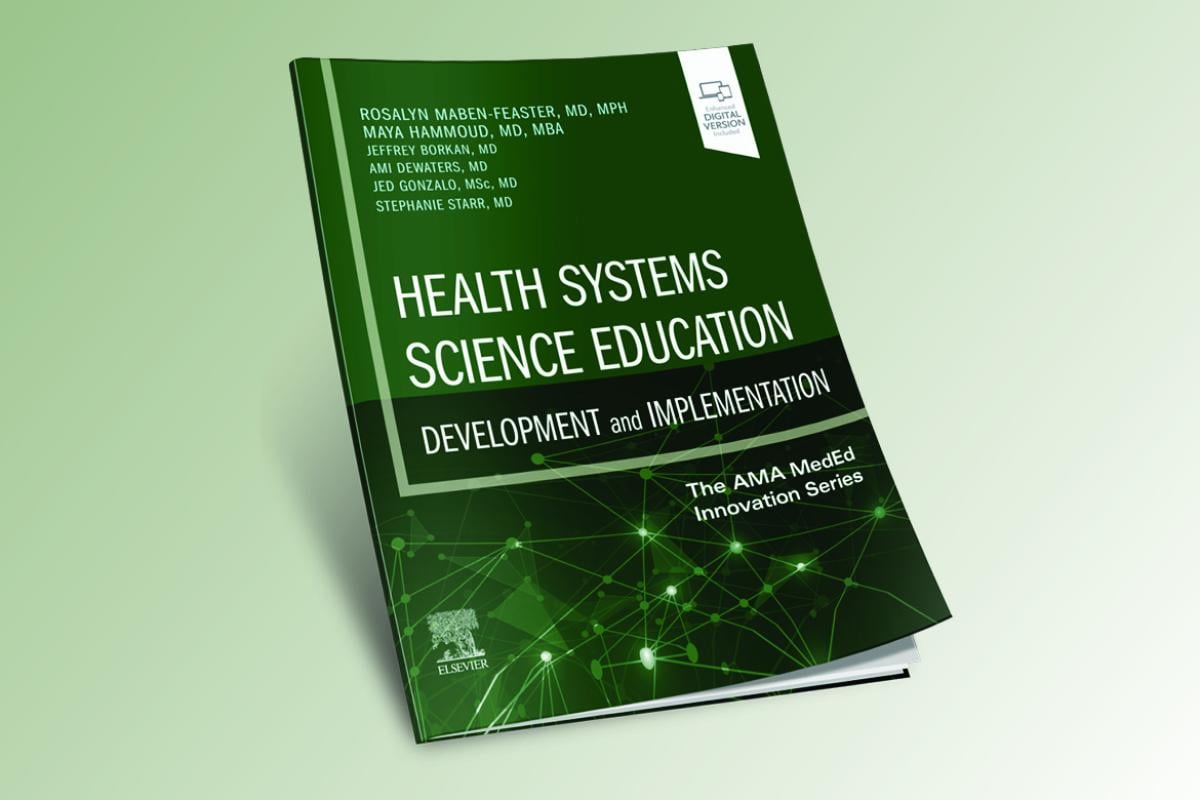The AMA’s Accelerating Change in Medical Education Consortium works across the educational continuum with visionary partners to create bold innovations. Take a look at our publications to learn more about the innovations that have emerged from the transformative efforts in undergraduate and graduate medical education.
Latest releases
Read Reimagining Residency: An AMA Initiative to Transform GME
Read the recently published Journal of Graduate Medical Education supplement featuring the work of the six-year, $20 million AMA Reimagining Residency initiative.
Reimagining Medical Education: The Future of Health Equity and Social Justice
As part of the American Medical Association Innovation in Medical Education Series with Elsevier, Reimagining Medical Education: The Future of Health Equity and Social Justice has been published. The externally commissioned publication is in response to a 2021 report by the AMA Council on Medical Education and imagines how to achieve social justice and racial equity through medical education; improve the diversity of the health workforce; and ameliorate inequitable outcomes among minoritized and marginalized patient populations.
Watch on-demand webinar. David Henderson, MD, the AMA vice president of equity, diversity, and belonging for medical education, recently moderated a discussion on the development and potential impact of the publication. Other participants in the conversation included Joaquin Baca, AMA director of equity, diversity and belonging for medical education, and two of the book’s editors—William McDade, MD, chief diversity, equity, and inclusion officer at ACGME, and Janet Southerland, DDS, MPH, PhD, vice chancellor academic affairs and chief academic officer at Louisiana State University Health Sciences Center.
AMA Academic Medicine supplement on precision education
As part of the AMA ChangeMedEd initiative’s new strategic focus on precision education, the AMA supported a supplement in the April 2024 issue of Academic Medicine entitled, “The Next Era of Assessment: Advancing Precision Education for Learners to Ensure High-Quality, Equitable Care for Patients.”
In the supplement, authors compel readers to consider a next era of assessment that places less focus on how assessment is done (e.g., tests, work-based assessment) and more focus on why it is done: to ensure high-quality, equitable care for patients.
Coaching in GME Medical Education Faculty Handbook
The AMA ChangeMedEd® initiative recently published Coaching in Graduate Medical Education—A Faculty Handbook, the third in the AMA’s series of books focused on coaching. Inspired by a need for a repository of best practices and recommendations for creating coaching programs in graduate medical education (GME), the handbook presents the work of experts inside and outside of ChangeMedEd who have implemented coaching programs in GME at their own institutions.
Coaching is an increasingly common component of medical education, and it has the power to transform residents and fellows into self-actualized, adaptive learners. From envisioning goals for a new program, planning logistics, and preparing faculty and learners, the authors of this handbook’s chapters have used their own coaching program expertise and understanding of the literature to create a practical resource that is generalizable to the broader community.
Download the free handbook now.
Learn more: To implement coaching in GME, look to those who’ve done it
MedEd’s horizon: Just, merciful, diverse and equitable
MedEd’s horizon: Just, merciful, diverse and equitable is a compendium of abstracts submitted to the AMA externally commissioned publication, Reimagining Medical Education: The Future of Health Equity and Social Justice. This publication is available for download from the AMA website at no cost (registration required).
These abstracts focus on reimagining the future of health equity and racial justice in medical education; improving the diversity of the health workforce; and ameliorating inequitable outcomes among minoritized and marginalized patient populations. Over 150 groups of authors responded to the call for submissions.
This compendium highlights submissions that were deemed to have merit but could not be included in the primary text due to limitations in the size of the volume. The final study, Reimagining Medical Education, was published by Elsevier in November 2024.
Educator Well-Being in Academic Medicine
A new book published by the AMA, is available for download from the AMA website for no cost (registration required). Written and edited by experts from across the country who have studied, planned, and implemented educator well-being programs in undergraduate and graduate medical education, it provides concrete, systems-based solutions to better support the educational mission, and by extension, educator well-being.
Health Systems Science Education: Development and Implementation
Health Systems Science Education: Development and Implementation, the fourth volume in the AMA MedEd Innovation Series published by Elsevier, is available now.
This book is a first-of-its-kind, instructor-focused field book that equips educators to not just teach health systems science, but to know how to integrate and implement health systems science comprehensively and effectively across the curriculum.
Journals
Medical Teacher supplement
The work of the American Medical Association Accelerating Change in Medical Education Consortium has advanced medical education reforms called for a decade ago, according to series of papers published in a special Medical Teacher supplement. The included papers explore:
- The successes, challenges and lessons learned by the consortium in working to deeply reform medical education by expanding the implementation of competency-based medical education
- Leveraging the power of information in delivering both care and education
- Viewing health systems science as a new form of professionalism in medicine
- Strengthening interdependence among educational programs, communities and health systems
- Aligning development of the health care workforce with societal needs and enhanced diversity
Open access downloadable publications
Facilitating Effective Transitions Along the Medical Education Continuum handbook
The AMA Accelerating Change in Medical Education Consortium in conjunction with experts at Wayne State University School of Medicine, the Spencer Fox Eccles School of Medicine at the University of Utah, and the University of Michigan Medical School has published a new coaching guide for learners and educators navigating each stage of medical training. The Facilitating Effective Transitions Along the Medical Education Continuum handbook takes a deep dive into the needs of learners along the continuum of medical education—from the beginning of medical school through the final stage of residency.
AMA Telehealth Clinical Education Playbook
The Telehealth Clinical Education Playbook is now available as a free download.
This book, created by experts at Virginia Commonwealth University, the University of North Dakota School of Medicine and Health Services, Mayo Clinic College of Medicine, Duke University College of Medicine, and Stanford University Medical Center, provides a framework to organize and implement telehealth clinical education—especially at the patient encounter level.
It Takes Two: A Guide to Being a Good Coachee
Academic coaching is emerging as a path that transforms students into self-actualized, adaptive learners. The AMA’s It Takes Two: A Guide to Being a Good Coachee offers learners strategies and steps to be part of an effective coaching relationship, so that you get the most out of the coaching process.
You will find the resources you need to make coaching an integral part of your physician training. It Takes Two: A Guide to Being a Good Coachee is available as a free download.
Books
Coaching in Medical Education
Today’s medical school coaching programs integrate a wide variety of personalized goals—including professional identity formation and academic performance—as well as community building, leadership and lifelong learning skills, clinical skills development and more. Coaching in Medical Education, part of the American Medical Association’s MedEd Innovation Series, is a first-of-its-kind, instructor-focused field book that equips educators to coach all learners and run an effective coaching program, increasing the likelihood of learner (and thus physician) success.
Health Systems Science, 2nd edition
The first textbook devoted to this emerging area, Health Systems Science now brings you fully up to date with today’s key issues and solutions. This increasingly important aspect of medical education explores how health care is delivered, how health care professionals work together to deliver that care, and how the health system can improve patient care and health care delivery.
Along with basic and clinical sciences, health systems science has become a crucial “third pillar” of medical science, with an emphasis on understanding the role of human factors, systems engineering, leadership and patient improvement strategies that will help transform the future of health care and ensure greater patient safety.
In this second edition, new chapters, new exercises and new information help you acquire the knowledge and skills you need for success in today’s challenging health care system.
Health Systems Science Review
Health Systems Science Review is a first-of-its-kind review book designed to prepare future physicians and other health care professionals to function effectively within health systems by better understanding how health care is delivered, how health care professionals work together to deliver that care, and how the health system can improve patient care and health care delivery.
This study tool provides case-based questions followed by discussions of answers and suggested readings—making it a valuable review resource for medical students and instructors, as well as:
- Medical residents
- Nursing, allied health and public health students
- Hospital administrators
Value-Added Roles for Medical Students
Providing real-life clinical experiences and context to medical students is an essential part of today’s medical education, and the partnerships between medical schools and health systems are an integral part of this approach. Value-Added Roles for Medical Students, the second volume in the American Medical Association’s MedEd Innovation Series, is a first-of-its-kind, instructor-focused field book that inspires educators to transform the relationship between medical schools and health systems with authentic workplace roles for medical students, adding relevance to medical education and patient care.
Master Adaptive Learner
Tomorrow’s best physicians will be those who continually learn, adjust and innovate as new information and best practices evolve, reflecting adaptive expertise in response to practice challenges. As the first volume in the American Medical Association’s MedEd Innovation Series, The Master Adaptive Learner is an instructor-focused guide covering models for how to train and teach future clinicians who need to develop these adaptive skills and utilize them throughout their careers.


